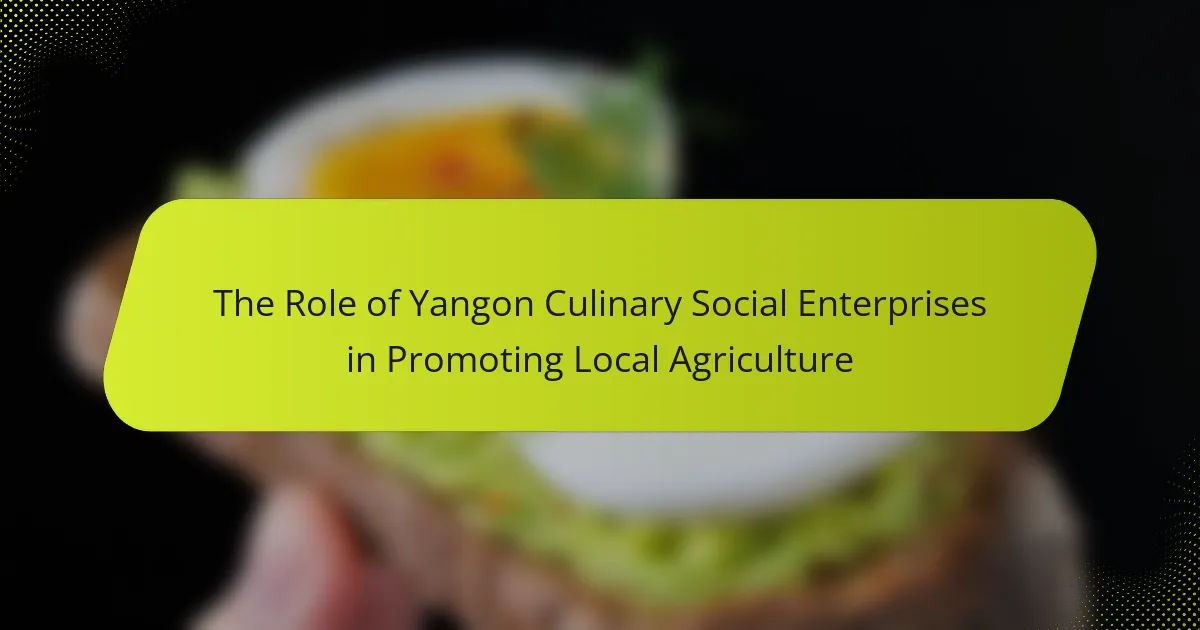Yangon Culinary Social Enterprises are organizations that integrate culinary practices with social missions to address social issues while promoting local food culture. These enterprises support local farmers by sourcing ingredients directly from them, enhancing the local economy and encouraging sustainable agriculture. They provide training and employment opportunities to marginalized communities, aiming to improve food security and nutrition in the region. Despite facing challenges such as limited resources, inconsistent supply chains, and market competition, these enterprises play a crucial role in raising awareness about the benefits of local agriculture and preserving traditional cooking methods. Their initiatives contribute significantly to the sustainability and resilience of the local food system.

What are Yangon Culinary Social Enterprises?
Yangon Culinary Social Enterprises are organizations that combine culinary practices with social missions. They focus on addressing social issues while promoting local food culture. These enterprises often support local farmers by sourcing ingredients directly from them. This practice enhances the local economy and encourages sustainable agriculture. Many Yangon Culinary Social Enterprises provide training and employment opportunities to marginalized communities. They aim to improve food security and nutrition in the region. By fostering community engagement, these enterprises create awareness about local agricultural practices. Their initiatives contribute to the preservation of traditional cooking methods and local cuisines.
How do Yangon Culinary Social Enterprises operate?
Yangon Culinary Social Enterprises operate by integrating local agricultural products into their culinary offerings. They source ingredients directly from local farmers, promoting sustainable agriculture. These enterprises aim to create social impact by providing fair wages and employment opportunities. They often focus on training and empowering marginalized communities. Many of these enterprises also engage in community outreach and education about nutrition. By fostering partnerships with local producers, they enhance the local economy. Their business models often include a profit-sharing mechanism to support community initiatives. This approach not only benefits consumers but also strengthens the agricultural sector in Yangon.
What types of services do these enterprises provide?
Yangon culinary social enterprises provide various services that support local agriculture. They offer farm-to-table dining experiences that showcase locally sourced ingredients. These enterprises also conduct cooking classes to educate the community about local produce. Additionally, they engage in food processing to create value-added products from local crops. They often participate in farmers’ markets to connect directly with consumers. Some enterprises provide catering services that highlight local agricultural products. They may also run community outreach programs to promote sustainable farming practices. These services collectively enhance the visibility and viability of local agriculture in Yangon.
How do these enterprises engage with local communities?
Yangon culinary social enterprises engage with local communities by sourcing ingredients directly from local farmers. This practice supports local agriculture and boosts the local economy. They often conduct workshops to educate community members about sustainable farming practices. Additionally, these enterprises create job opportunities for locals, fostering economic development. They also promote local food culture through events and collaborations with community chefs. By creating a network of local suppliers, they enhance community resilience. Their engagement often includes feedback loops, allowing locals to influence menu development. This collaborative approach strengthens community ties and promotes shared values around food.
Why are Yangon Culinary Social Enterprises important for local agriculture?
Yangon Culinary Social Enterprises are important for local agriculture because they create direct market access for local farmers. These enterprises source ingredients from nearby agricultural producers. This practice boosts local economies by ensuring farmers receive fair prices. It also encourages sustainable farming practices through consistent demand for fresh, local produce. According to a report by the Food and Agriculture Organization, local sourcing can increase farmer income by up to 30%. Additionally, these enterprises promote awareness of local agricultural diversity among consumers. This educational aspect fosters a stronger connection between urban consumers and rural producers. Overall, they play a vital role in enhancing the viability of local agriculture in Yangon.
What role do these enterprises play in supporting local farmers?
Yangon culinary social enterprises play a crucial role in supporting local farmers. They create direct market access for farmers, ensuring their produce reaches consumers. These enterprises often prioritize sourcing ingredients locally, which boosts the local economy. By partnering with farmers, they provide training and resources to improve agricultural practices. This collaboration enhances the quality and quantity of produce available. Additionally, they promote sustainable farming methods, which benefit the environment. According to a study by the Food and Agriculture Organization, local sourcing can increase farmers’ incomes by up to 30%. This demonstrates the significant impact these enterprises have on local agricultural communities.
How do they contribute to sustainable agricultural practices?
Yangon culinary social enterprises contribute to sustainable agricultural practices by sourcing ingredients locally. This reduces transportation emissions and supports local farmers. They prioritize organic and sustainable farming methods. This promotes biodiversity and soil health. Additionally, these enterprises educate consumers about sustainable practices. They create awareness of the importance of supporting local agriculture. By fostering community relationships, they enhance food security. This approach leads to a more resilient agricultural ecosystem.

How do Yangon Culinary Social Enterprises promote local agriculture?
Yangon Culinary Social Enterprises promote local agriculture by sourcing ingredients directly from local farmers. This practice supports the local economy and encourages sustainable farming methods. By prioritizing local produce, these enterprises reduce transportation costs and carbon footprints. They also provide farmers with fair prices, which incentivizes them to grow more diverse crops. Additionally, these enterprises often host workshops and training sessions for farmers. This education focuses on best practices in sustainable agriculture. As a result, the collaboration enhances food security in the region. Furthermore, these enterprises raise awareness among consumers about the benefits of supporting local agriculture.
What initiatives do these enterprises implement to support agriculture?
Yangon culinary social enterprises implement various initiatives to support agriculture. They prioritize sourcing ingredients locally from farmers. This practice helps boost local economies and encourages sustainable farming methods. Additionally, these enterprises often conduct training programs for farmers. These programs focus on improving agricultural techniques and increasing crop yields. They also promote awareness of the importance of local produce among consumers. By creating direct market access for farmers, these enterprises enhance their livelihoods. Furthermore, some initiatives involve collaborating with agricultural organizations. This collaboration aims to address challenges faced by local farmers. Overall, these initiatives contribute significantly to the local agricultural ecosystem.
How do they create partnerships with local farmers?
Yangon culinary social enterprises create partnerships with local farmers through direct engagement and collaboration. They often initiate dialogue with farmers to understand their needs and challenges. These enterprises may offer training programs to enhance farming practices. They also provide fair pricing for produce, ensuring farmers receive equitable compensation. By establishing consistent supply chains, they foster reliable relationships. Additionally, they promote the use of local ingredients in their culinary offerings. This approach supports farmers’ livelihoods while enhancing the quality of their dishes. Research indicates that such partnerships can lead to increased agricultural sustainability and community resilience.
What educational programs do they offer regarding agricultural practices?
They offer various educational programs focused on sustainable agricultural practices. These programs include workshops on organic farming techniques. They also provide training on crop rotation and soil health. Participants learn about pest management and sustainable water use. Additionally, they host community events to share knowledge on local farming traditions. These initiatives aim to enhance agricultural productivity and sustainability. Evidence of their impact includes increased local farmer engagement and improved crop yields.
How do these enterprises influence consumer behavior towards local produce?
Yangon culinary social enterprises influence consumer behavior towards local produce by creating awareness and fostering community engagement. These enterprises often highlight the benefits of consuming local products. They provide educational workshops and events that showcase local ingredients. This direct interaction encourages consumers to make informed choices. Additionally, these enterprises often emphasize the quality and freshness of local produce. They frequently feature local farmers and suppliers in their marketing efforts. This builds trust and promotes a sense of community support. Research shows that consumers are more likely to purchase local produce when they feel connected to the source.
What marketing strategies do they use to promote local ingredients?
Yangon culinary social enterprises utilize various marketing strategies to promote local ingredients. They often emphasize storytelling to connect consumers with local farmers. This builds an emotional connection and enhances the perceived value of the ingredients. They also engage in community events and farmers’ markets to showcase local produce directly to consumers. Social media platforms are leveraged to share visually appealing content, highlighting the freshness and quality of local ingredients. Collaborations with local chefs and influencers further amplify their reach. Educational workshops about the benefits of local sourcing are conducted to inform consumers. These strategies collectively aim to foster a sustainable food culture while supporting local agriculture.
How do they raise awareness about the benefits of consuming local products?
Yangon culinary social enterprises raise awareness about the benefits of consuming local products through various strategies. They conduct community workshops to educate consumers on the nutritional and economic advantages of local sourcing. These enterprises often collaborate with local farmers, showcasing their produce in restaurants and markets. They use social media campaigns to highlight stories of local farmers and their products. They also host tasting events to engage the public directly with local foods. Research shows that local products often have higher freshness and flavor, which enhances consumer interest. By sharing these benefits, they encourage community support for local agriculture.

What challenges do Yangon Culinary Social Enterprises face in promoting local agriculture?
Yangon Culinary Social Enterprises face several challenges in promoting local agriculture. Limited access to resources hampers their ability to source ingredients from local farmers. Inconsistent supply chains create difficulties in maintaining a steady flow of fresh produce. Market competition from larger businesses often undermines the efforts of these social enterprises. Additionally, lack of awareness among consumers about the benefits of local sourcing affects demand. Regulatory hurdles may complicate partnerships with local farmers. Financial constraints can limit investment in sustainable practices. Lastly, logistical issues, such as transportation and storage, pose significant barriers to effective operations.
What obstacles do they encounter in sourcing local ingredients?
Culinary social enterprises in Yangon face several obstacles in sourcing local ingredients. Limited availability of certain local produce restricts their options. Seasonal fluctuations affect the consistency of ingredient supply. Infrastructure challenges hinder transportation from farms to markets. Additionally, pricing issues can make local ingredients less competitive compared to imports. These factors collectively impact the ability of enterprises to maintain a stable menu and support local farmers effectively.
How do economic factors affect their operations?
Economic factors significantly influence the operations of Yangon culinary social enterprises. These enterprises rely on local agricultural products for their offerings. Fluctuations in market prices can affect the cost of ingredients. A rise in ingredient costs may lead to increased menu prices. Conversely, lower prices can enhance profit margins. Economic stability encourages consumer spending on dining experiences. In contrast, economic downturns may reduce disposable income, impacting sales. Additionally, access to funding and investment is crucial for growth. Economic conditions determine the availability of such financial resources. Overall, economic factors shape pricing strategies, sourcing decisions, and overall sustainability of these enterprises.
What are the logistical challenges in working with local farmers?
Logistical challenges in working with local farmers include inconsistent supply, transportation issues, and lack of infrastructure. Inconsistent supply arises from unpredictable weather and crop yields. Transportation issues can stem from inadequate road conditions and limited access to markets. Lack of infrastructure often means insufficient storage facilities for perishable goods. These challenges can lead to delays in delivery and increased costs. According to a report by the Food and Agriculture Organization, 30% of food produced in developing countries is lost due to logistical inefficiencies. Addressing these challenges is crucial for the success of culinary social enterprises in Yangon.
How do Yangon Culinary Social Enterprises overcome these challenges?
Yangon Culinary Social Enterprises overcome challenges through community engagement and innovative practices. They collaborate with local farmers to source fresh ingredients. This partnership ensures a steady supply of produce while supporting the local economy. Additionally, these enterprises implement training programs for chefs and staff. This enhances culinary skills and promotes local cuisine. They also utilize social media for marketing, increasing visibility and customer reach. By focusing on sustainability, they attract eco-conscious consumers. Furthermore, many enterprises reinvest profits into community projects, fostering goodwill and support. These strategies collectively strengthen their resilience in the competitive food industry.
What innovative solutions have they implemented?
Yangon culinary social enterprises have implemented innovative solutions such as farm-to-table initiatives. These initiatives connect local farmers directly with restaurants. They ensure fresh produce reaches consumers while supporting local agriculture. Additionally, many enterprises have adopted sustainable sourcing practices. This reduces environmental impact and promotes biodiversity. They also conduct workshops to educate farmers on modern agricultural techniques. These efforts improve crop yield and quality. Furthermore, partnerships with local communities enhance food security. Such innovative solutions foster economic growth and social responsibility in Yangon.
How do they adapt to changing market conditions?
Yangon culinary social enterprises adapt to changing market conditions by diversifying their offerings. They incorporate seasonal ingredients to align with local agricultural cycles. This strategy ensures freshness and supports local farmers. Additionally, they engage with community feedback to refine their menus. This responsiveness helps them meet consumer preferences effectively. They also leverage social media for marketing, allowing real-time adaptation to trends. By collaborating with local producers, they strengthen supply chains. This approach fosters resilience against market fluctuations. Overall, these enterprises demonstrate agility in their operations to thrive in dynamic environments.
What best practices can be learned from Yangon Culinary Social Enterprises?
Best practices learned from Yangon Culinary Social Enterprises include community engagement, sustainable sourcing, and culinary education. Community engagement fosters local collaboration and builds trust among stakeholders. Sustainable sourcing emphasizes the use of local ingredients, which supports local farmers and reduces carbon footprints. Culinary education empowers local communities by teaching skills and promoting traditional dishes. These practices enhance food security and promote responsible consumption. Research shows that such enterprises positively impact local economies by increasing income for farmers and creating job opportunities in the culinary sector.
How can other regions implement similar models for local agriculture?
Other regions can implement similar models for local agriculture by establishing culinary social enterprises. These enterprises can connect local farmers with consumers, ensuring fresh produce reaches markets. They can provide training for farmers on sustainable practices. Additionally, they can create platforms for farmers to sell directly to restaurants and consumers. This model encourages community engagement and supports local economies. Studies show that regions with such enterprises see increased agricultural productivity and reduced food waste. For example, initiatives in Southeast Asia have successfully linked culinary ventures with local farming networks, boosting both sectors.
What tips can be shared for enhancing community engagement in agricultural initiatives?
Enhancing community engagement in agricultural initiatives can be achieved through several effective strategies. First, fostering partnerships with local organizations can create a broader support network. Collaborating with schools and community groups increases awareness and participation. Second, organizing workshops and events encourages hands-on involvement. These activities help educate participants about sustainable practices. Third, utilizing social media platforms can amplify outreach efforts. Engaging content can attract a wider audience and promote events. Fourth, establishing feedback mechanisms allows community members to voice their opinions. This inclusion fosters a sense of ownership and investment in initiatives. Lastly, showcasing success stories can inspire others. Highlighting positive outcomes encourages further participation.
Yangon Culinary Social Enterprises are organizations that merge culinary practices with social missions to address social issues while promoting local food culture. They support local farmers by sourcing ingredients directly, enhancing the local economy and encouraging sustainable agriculture. These enterprises provide training and employment opportunities to marginalized communities, improve food security, and raise awareness about local agricultural practices. The article explores their operational models, community engagement strategies, and the challenges they face, while highlighting their significant role in supporting local agriculture and fostering economic development in Yangon.
